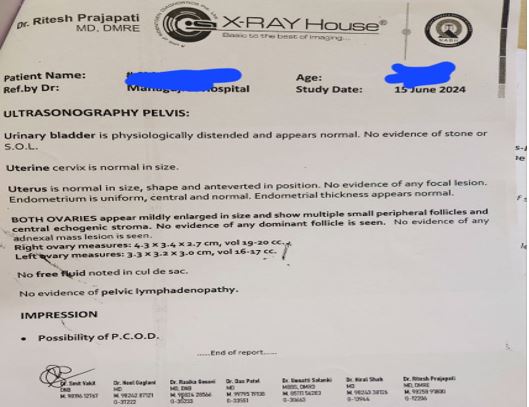Case Report on Ayurveda management of Polysystic Ovarian Syndrome (PCOS)
DOI:
https://doi.org/10.21760/jaims.10.7.59Keywords:
Ayurveda, PCOS, Nasyakarma, Shatapushapa Taila, Kanchanar Guggulu, ArtavakshayaAbstract
Polycystic Ovarian Syndrome (PCOS) is common problem among the reproductive age (18-40 years) of women. It is endocrine and gynecology problem. PCOD become lifestyle disorder now a day’s because of sedentary habits, eating fast food, follow faulty life style. The exact cause of PCOS is unknown but high level of insulin, hyper androgen (male hormone), LH (luteinizing hormone) are the main causes. The symptoms of PCOS are delayed menstruation, oligomenorrhea, acne, hirsutism, thinning of hair, obesity, and constipation. In Ayurveda PCOS is not direct term coined but clinically it is resembled with Aartavavaha Sroto Dushti, Aartava Kshaya and Beejashaya Granthi. A case of 17 year old female patient with complains of no menstruation since 4 months and acne on face was attended OPD of Prasuitantra evam Streeroga department of J.S Ayurveda Mahavidyalaya. She had her first menstruation at age of 16 year. Patient was successfully treated by various Ayurveda medicines and Nasya therapy at OPD of Prasuitantra Evam Streeroga Department of JS Ayurveda Mahavidyalaya. Patient got significant relief in delay menstruation and had mild relief in acne on face after the 3 months of Ayurveda treatment. Her USG report suggested volume reduction in bilateral ovaries also.
Downloads
References
Konar H. D.C. Dutta’s textbook of gynecology. 8th ed. New Delhi: Jaypee Brothers Medical Publishers; Chapter 29. p.384.
Riley DS, Barber MS, Kienle GS, Aronson JK, von Schoen-Angerer T, Tunwell P, et al. CARE guideline for case reports: explanation and elaboration document. J Clin Epidemiol. 2017 Sep 1;89:218–35.
Dhandapani K, Kodavanji B, Anantharaya VN, Kumar NA. Prevalence and distribution of causes of infertility according to women’s age: a cross-sectional study in a tertiary healthcare hospital setup. J Basic Clin Physiol Pharmacol. 2021 Jun 29.
Kiconco S, Teede HJ, Azziz R, Norman RJ, Joham AE. The need to reassess the diagnosis of polycystic ovary syndrome: a review of diagnostic recommendations from the international evidence-based guideline for the assessment and management of PCOS. Semin Reprod Med. 2021 Aug 17. New York: Thieme Medical Publishers.
Fulghesu AM, Piras C, Dessi A, Succu C, Atzori L, Pintus R, et al. Urinary metabolites reveal hyperinsulinemia and insulin resistance in polycystic ovarian syndrome. Metabolites. 2021 Jul;11(7):437.
Diamanti-Kandarakis E, Kandarakis H, Legro RS. The role of genes and environment in the etiology of PCOS. Endocrine. 2006 Aug;30(1):19–26.
Hart R, Doherty DA. The potential implications of a PCOS diagnosis on women’s long-term health using data linkage. J Clin Endocrinol Metab. 2015 Mar 1;100(3):911–9.
Chaudhary A. Clinical treatment of polycystic ovary syndrome in Ayurveda.
Ghatwate RB. A case report on Ayurveda management of polycystic ovarian syndrome (PCOS). World J Pharm Pharm Sci. 2020;9(11):1810–5.
Barbieri RL. Polycystic ovarian disease. Annu Rev Med. 1991 Feb;42(1):199–204.
Nehara H. Ayurveda and modern perspective on polycystic ovarian syndrome: a review based on literary study. Himal J Health Sci. 2019 Jul 16;1(1):9–12.
Rath P. Management of PCOS through homoeopathy: a case report.
Magotra A. Management of PCOD w.s.r. to Ayurvedic drugs and lifestyle. J Ayurveda Integr Med Sci. 2020 Oct 31;5(5):287–9.
International Journal of Pharmaceutical Research and Application. 2023 Jul–Aug;8(4):989–97.
Goyal S, Rath S. A comprehensive review of Jatamansi. Int J Res Ayush Allied Syst.
Kathoke MH, et al. PCOS: management of PCOS. World J Pharm Med Res.
Sharma P, et al. Yoga—a safe and effective treatment for PCOS: an Ayurvedic review. World J Pharm Med Res. 2021;7(10).
Ghatwate RB. A case report on Ayurveda management of polycystic ovarian syndrome (PCOS). World J Pharm Pharm Sci. 2020;9(11):1810–5.
Muhas C, Nishad KM, Ummunnoora KP, Jushna K, Saheera KV, Dilsha KP. Polycystic ovary syndrome—an overview. Int J Curr Pharm Res. 2018;10(6).
Tasoula T, Overton C, Conway GS. The pathophysiology of polycystic ovary syndrome. Clin Endocrinol (Oxf). 2004;60:1–17.















